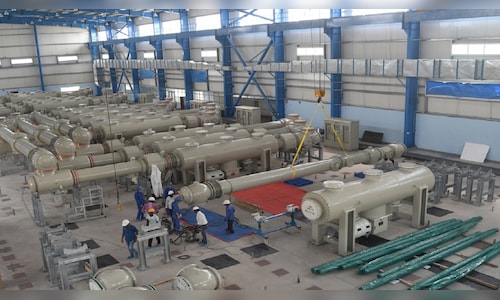Chinese Stocks Plunge Amid Renewed U.S.-China Trade Tensions, Offshore Yuan Slips Further
Sino-U.S. Trade Tensions Resurge, Impacting Chinese Markets
Chinese stocks listed in Hong Kong faced renewed selling pressure on June 2, sliding to their lowest levels in nearly a month. This volatility comes amid escalating Sino-U.S. trade tensions following a renewed exchange of tariffs. The offshore yuan also weakened, signaling growing concerns over the trade relationship between the two economic powerhouses.
Market Reactions: Hang Seng and Offshore Yuan Plummet
The Hang Seng China Enterprises Index, which tracks mainland companies listed in Hong Kong, fell sharply, decreasing 2.6% to a low not seen since May 6. Similarly, Hong Kong’s benchmark Hang Seng Index dropped by 2.2%, settling at 22,778.45. These declines reflected widespread market anxiety as investors digested the implications of renewed tariff talks.
- Key Highlights:
- Hang Seng China Enterprises Index fell by 2.6%.
- Hang Seng Index declined by 2.2% to 22,778.45.
- Offshore yuan traded at 7.2193 per dollar, a decrease of 0.2%.
Concerns were pervasive throughout various sectors, with the Hang Seng Tech Index losing 2.4%, and both the property and healthcare sectors suffering losses exceeding 3%.
U.S.-China Trade Tensions: The Background
The latest wave of tensions stems from allegations from U.S. President Donald Trump, claiming that China had violated agreements made in previous Geneva talks. In response, China’s Commerce Ministry dismissed Trump’s accusations as "groundless" and emphasized that it would implement "forceful measures" to protect its legitimate rights and interests.
Treasury Secretary Scott Bessent indicated that top leaders from both nations will soon engage in discussions to tackle significant trade concerns, including disagreements over critical minerals. These conversations are essential to rebuilding trust and stability in the trade framework, which has seen significant strain in recent years.
Sector-Specific Impact on the Hong Kong Market
The current tension has led to specific sectors feeling the heat more than others. Among the most notable declines was local property firm New World Development, which plunged 7.5% to a fresh two-month low after deferring coupon payments. This translates to a growing risk perception associated with property investments in Hong Kong:
- Sector Performance:
- Technology sector: -2.4%
- Property subindex: -3%
- Healthcare sector: -3%
Additionally, car manufacturers continued to experience a downward trend, primarily attributed to concerns around price wars. Shares of Li Auto dived 4.2%, while competitors BYD and Nio also faced steep losses, each dropping more than 3%.
Implications for Investors and Future Trends
The recent market movements underscore the delicate balancing act investors must perform in assessing the U.S.-China trade relationship. The long-term implications of these trade tensions could lead to increased volatility across various sectors, particularly in technology and automotive.
Investors may want to consider the following strategies in light of the current market climate:
- Diversifying Investments: With the property and tech sectors under pressure, diversifying into more stable sectors might mitigate risk.
- Staying Informed: Keeping abreast of Sino-U.S. negotiations can provide essential insights into potential market shifts.
- Short-term Trading: The volatility might present short-term trading opportunities for savvy investors looking to capitalize on price fluctuations.
As mainland markets close for the Dragon Boat Festival, investors will be keenly watching the developments leading to their trading resumption. The fate of Chinese stocks and the offshore yuan will largely hinge on the outcomes of the impending talks between President Trump and President Xi Jinping.
In summary, the resurgence of trade tensions between the U.S. and China has placed downward pressure on Chinese shares in Hong Kong, while the offshore yuan has weakened. As the dialogue between the two nations continues, the market remains highly reactive to news and sentiment surrounding these crucial discussions. Investors are certainly facing a landscape marked by uncertainty, and it will be vital to navigate this terrain with caution.





